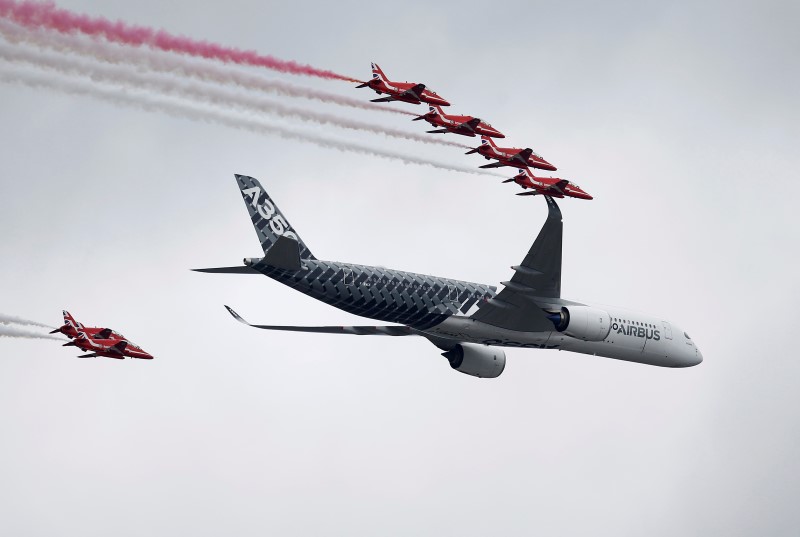By Sarah Young
FARNBOROUGH, England (Reuters) - With UK factories working at full tilt to meet bumper demand for aeroplanes, aerospace executives have been quick to brush aside fears of any imminent threat from Britain's exit from the European Union.
The industry is locked into production cycles that can take up to three decades to play out, big customers like Boeing (N:BA) have rallied to support local suppliers and more work is coming Britain's way as the U.S. aerospace giant and its European rival Airbus ramp up output.
That means it could be years before any real impact of the UK's divorce from the European Union becomes clear. For now, many of those attending the Farnborough Airshow this week said they were drawing up lists of what was needed as Britain rethinks its trading relationships.
"We will simply get on with it," Warren East, the chief executive of Britain's biggest aerospace company Rolls-Royce (L:RR), told reporters.
The UK's pre-eminence in aerospace, as the biggest player in the world after the United States, is driven by know-how and a record of industrial efficiency built up over decades.
Currently, British suppliers are trying to deal with a surge in business, with output up 39 percent in the last five years, much of it driven by exports.
And since the vote to leave the EU on June 23, two big aerospace investors, Boeing and Italy's Leonardo Finmeccanica (MI:LDOF), which makes helicopters in the UK, have both said they planned to increase their British presence.
The concern is that the UK's standing could weaken over time.
Although it is the heart of design and production for Airbus passenger jet wings, and its Broughton plant in Wales is one of the group's most efficient facilities, some wings are now equipped in Airbus's Bremen factory in Germany.
Industry executives conceded that Brexit will force them to work harder to win new business, including those crucial new programmes at Airbus which might otherwise be awarded to the aerospace giant's industrial bases in France and Germany.
"Nothing comes to us naturally, so if the UK is going to succeed in the future, it's got to have the best economics and the best technology," said Marcus Bryson, a former executive at FTSE 100 parts supplier GKN (L:GKN), who was last year named as a lead UK government adviser for aerospace.
Other areas of concern include whether Britain could risk losing its place at the top table on big aerospace projects if it is locked out of vital research funding and that throwing up new borders will add costs and complexity for companies trying to move goods and people around a global business, making them think twice about new investments in the UK.
"We had probably 60 people from the industry at our breakfast event at Farnborough and I think everyone viewed Brexit as pretty disastrous," said Robert Thomson, an aerospace specialist at management consultancy Roland Berger.
ACCESS TO SKILLS
Almost a quarter of a million people work in UK aerospace, in around 3,000 companies. France and Germany often get to host final assembly of new aircraft, but a big chunk of the profits come to the UK where many of the complex parts are produced, from fuselages and engines to nacelles and landing gear.
Executives say they are talking to government about what will be most important to help secure the industry's future.
Bristol-based Boxarr, a supplier of software to Boeing and Airbus, employs 20 people including a Spaniard and has just hired a French engineer.
"The government need to reassure us about access to skills in the EU because we can't get the skills in this country of the type that we need, particularly engineering and mathematics," said Boxarr CEO Alasdair Pettigrew.
Airbus, GKN and Rolls-Royce also said any change to EU freedom of movement rules would be damaging as being able to move teams of engineers easily and quickly around their facilities in different European countries was helpful to efficiency.
Britain's aerospace industry could also get cut out of research and development funding, like the EU's 1.6 billion euro Clean Sky initiative to develop new aviation technologies.
For British aerospace trade body ADS, the key issue is one of certification, with the industry needing continued access to the European Aviation Safety Agency (EASA), the bloc's body for certifying new parts and components.
"Delays in certification would be catastrophic for UK industry," said ADS's Chief Economist and Director of Policy Jeegar Kakkad.
Bryson said the government should make capital grants readily accessible to small and medium-sized companies to help them cope with the uncertainty caused by Brexit.
"The natural inclination at the moment is to defer (investment), whereas what you want to do is to incentivise a board to say actually the government has created such a positive environment, we'd be nuts not to," Bryson said.
After Britain leaves the EU, it could strike a new trade deal, or alternatively, World Trade Organisation (WTO) rules could come into force. WTO rules enforce zero tariffs on aerospace component makers in contrast to finished cars, which are subject to a duty of nearly 10 percent.
The British industry already trades substantially beyond the EU, with non-EU exports accounting for around 69 percent of Britain's total aerospace exports last year, according to official data.
Since Britain's vote to leave the EU on June 23, the pound has fallen 14 percent to a 31-year low against the dollar, helping to lift the shares of companies like Rolls-Royce and Meggitt (L:MGGT), a Dorset-based FTSE 250 supplier of wheels and brakes for planes which has operations in both Europe and the U.S.

"Brexit is neutral in all regards, expect for currency, which is favourable," Meggitt CEO Stephen Young told Reuters.